




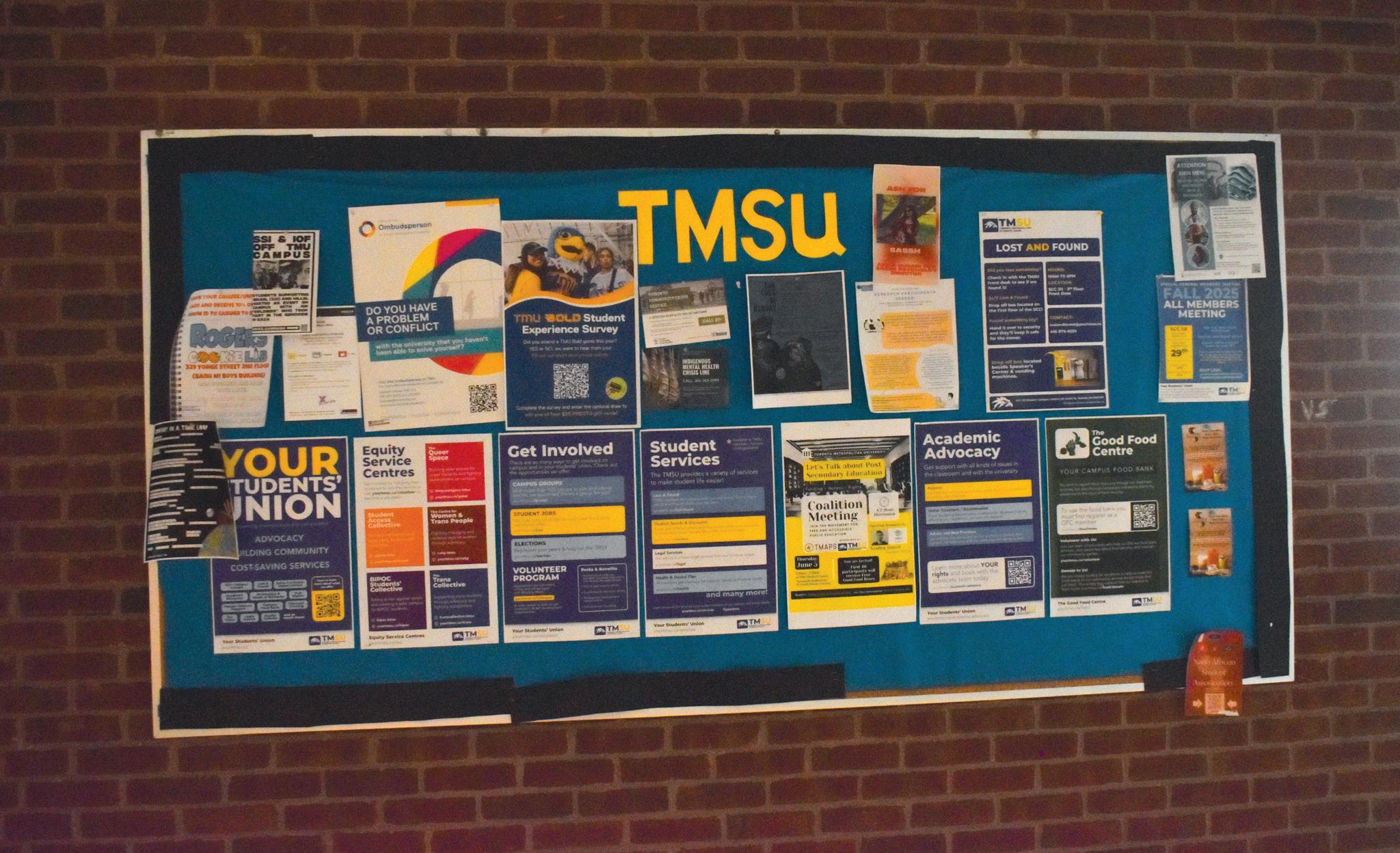
By Vihaan Bhatnagar
The Toronto Metropolitan Students’ Union (TMSU) is coming back from a summer of silence after voiding its April election and suspending its executive members.
On Aug. 26, the TMSU reestablished contact with students, announcing a proposal to postpone the Fall by-election—required by its bylaws due to the vacancies—until Spring 2026.
The proposed change will be voted on at a Special General Meeting (SGM) on Sept. 29.
The proposal followed an independent investigation that found a Fall 2025 by-election was unlikely to be free from the same outside interference that marred previous elections.
The investigation—conducted by MNP LLP—found attempts to manipulate the 2025 election results by Ali Yousaf, a former TMSU executive member from 2017 to 2020. It also found that “members of the 2025 Elections and Referenda Committee colluded to hire the Chief Returning Officer (CRO) to influence the 2025 election.”
Toronto Metropolitan University (TMU) president Mohamed Lachemi told The Eyeopener in a phone call that the university is currently holding funds collected from students on the union’s behalf until they resolve certain issues. “We have formally notified the student union that they are not meeting obligations under the contract, particularly financial management and appropriate governance,” said Lachemi.
The investigation looked into “allegations of threats, bodily harm, extortion, corruption, illegal electronic monitoring, corruption of TMSU vendors and counter-surveillance of MNP investigators.” The TMSU shared the findings with Toronto Police
Services who confirmed to The Eye that a fraud investigation is currently underway.
In the meantime, two executive directors with no prior connection to the union—Sally Lee and Scott Miller Berry—were hired over the summer to manage its operations.
Not the first time
The TMSU’s history is riddled with scandals that continue to shape its reputation among students.
In 2019, The Eye verified that over $260,000 worth of purchases—including food, clothing, alcohol and club purchases—had been made with a credit card under the name of then-Ryerson Students’ Union (RSU) president Ram Ganesh.
Ganesh and former vice-president operations Savreen Gosal, the signing officers on the RSU’s expenditures, were later suspended by the executive team. Ganesh was impeached on Feb. 11, 2019 at a Board of Directors (BoD) meeting. Within a year, three others resigned and one was impeached.
On Jan. 24, 2020, TMU terminated their 1986 operating agreement with the RSU, saying they had “lost confidence in the RSU’s ability to represent students.”
The termination meant the university no longer recognized the RSU as the official student government. It also restricted the union’s access to the student fees it collected on the union’s behalf.
The RSU filed a legal claim against the university four days later in the Ontario Superior Court of Justice. A judge eventually ruled in favour of the RSU, forcing the university to release the withheld student fees and reinstate the union.
In April 2020, a new fixed five-year agreement was negotiated between the union and the university. But the TMSU did not operate in-person for the next two years due to the COVID-19 pandemic.
The TMSU finalized their new
versy even before voting began on March 10, with 65 demerit points and seven rulings issued by the CRO in the leadup.
As of Sept. 2025, the TMSU has not disclosed the final results of the Spring 2025 general election. As the number of complaints lodged grew, the ERC advised the TMSU to delay the results of the election. In the days that followed, Team Reform Now and Team Reborn were disqualified with 218 and 85 demerit points respectively.
Jan. 2019
The Eyeopener reports that RSU executives spent up to $273,000 in food, clothing, alcohol and club purchases. President Ram Ganesh is impeached in February as a result. Three other executives are impeached within the year.
Jan. 2020
by-laws with over 200 attendees at the Dec. 1, 2022 Semi-Annual General Meeting (SAGM).
A look at 2023-24
What appeared to be a milestone at the 2022 SAGM soon deteriorated.
The Eye reported in March 2023 that a member of Team Revolt—one of two slates running in the election—accessed a student’s voting portal, violating Section 8.3.7.2 of the TMSU Elections Procedures Code (EPC). Students also reported being offered goods in exchange for votes.
Team Revolt was given 60 demerit points and disqualified as the EPC mandates disqualification after 35 points. Two days later, the TMSU Elections and Referenda Committee (ERC) voided the election, stating widespread misconduct which compromised the election’s integrity.
The ERC, an independent body overseeing the elections and enforcing the EPC, scheduled a new in-person election with physical ballots in April.
Come April, the election was cancelled and postponed to Fall 2023 after more rules were violated and what the TMSU described as “intentional efforts to undermine the integrity” of the election process.
The TMSU later sued several former executive members for colluding to sabotage the 2023 election. They announced in May 2024 that they had reached a settlement with the defendants, the details of which were confidential but included monetary compensation.
When the 2023 Fall election came around, a new executive team was brought in but several faculty representatives positions remained vacant.
The Spring 2024 election proceeded as planned, with the Celestial slate winning all executive seats on the TMSU BoD.
The 2025 general election
The TMSU’s Spring 2025 general election was marred by contro-
Ruling #29 states that a member of Team Reform Now distributed posters allegedly imitating Team Re-Elect’s branding and featuring inappropriate racist and inflammatory content. The majority of Team Reform Now’s demerit points came from this ruling. This was concluded by the CRO based on OneCard swipe data acquired from TMU’s security services. They also earned demerit points for campaigning without required volunteer badges.
Team Reborn was penalized for a member campaigning in a computer lab—an off-limits space— where they were allegedly helping students vote and threatening someone who tried to film them.
Both teams also acquired a total of an additional 100 demerit points for cross-campaigning and having a graduate student campaign for both slates. All graduate and part-time students are ineligible to campaign under the EPC.
Meanwhile Team Re-Elect— composed of the then-executive team—had only 10 demerit points, despite campaigning using their achievements while in office, such as the Offset and GEazy concert hosted at Sankofa Square in September 2024, sponsored varsity games and free breakfasts.
All of these achievements were executed using the TMSU’s student levy funding—an advantage that the other slates didn’t have.
While there is no by-law explicitly prohibiting this advantage, the EPC bars the “use of benefits acquired by virtue of office,” in regards to campaigning.
Members of Team Re-Elect, including then-candidates vice president operations Muhammad Awais, vice president education Aneesa Masood and vice president equity Koby Biya, allegedly approached students on campus during the active voting period, campaigning their slate while urging them to vote for them on the spot.
Team Re-Elect could have received a maximum of 55 demerit points according to the EPC, enough for disqualification—but most complaints were dismissed by then CRO Tatiana Carrion. Read more at theeyeopener.com
The university terminates their operating agreement with the RSU, declaring the union to no longer be the official student representative. Four days later, the RSU sued the school. A judge eventually ruled in favor of the RSU and reinstated it as the official student union.
April 2020
The university and RSU negotiate a new fixed five-year operating agreement. The onset of the COVID-19 pandemic means the union isn’t able to operate in-person for the next two years.
Dec. 2022
The newly renamed TMSU finalizes their all new by-laws at their SAGM.
March 2023
Team Revolt—one of two slates running in the 2023 general election—is disqualified from the election. The election is voided two days later. A new in-person election is scheduled to be held in April.
April 2023
The in-person election is cancelled and postponed to Fall.
Dec. 2024
TMSU begins receiving a series of anonymous emails alleging efforts to defraud and corrupt the TMSU.
The TMSU Board authorizes their legal counsel to retain an independent investigation.
Jan. 2025
TMSU legal counsel retains MNP LLP to conduct an investigation into the allegations from the anonymous emails. The investigation is later expanded to include allegations into interference in TMSU’s 2025 elections.
March 2025
Before the voting period for the 2025 general election began, 65 demerit points and seven CRO rulings had been issued.
The results of the election are delayed because of the increasing number of complaints lodged.
April 2025
The TMSU’s Board of Governors void the election and suspend a number of unnamed executives following the investigation launched earlier in the year.
June 2025
Two new interim co-executive directors—Sally Lee and David Miller Berry—are hired to manage operations at the union.
Aug. 2025
TMSU announces its proposal to postpone the Fall 2025 by-election to Winter 2026.
Sept. 29, 2025
TMSU is scheduled to hold a Special General Meeting where all TMSU members are invited to vote on the postponement of the by-election. The union will be required to hold a by-election before the end of 2025 if the motion fails.
By Sorousheh Salman
The Supporting Children and Students Act, also known as “Bill 33” was introduced on May 29 to Ontario’s legislature by the Education Minister Paul Calandra and has raised concerns among students across various postsecondary institutions.
If passed, the bill would grant the provincial government more authority over post-secondary institutions, including regulating student fees and monitoring “merit” based admissions. This has raised concerns about how domestic and international students’ tuition and university services will be affected.
“Education has been chronically and intentionally underfunded for decades and continues to be underfunded. The [provincial] government proves to us that education is not a priority,” said Omar Mousa,
the national executive representative for the Canadian Student Federation-Ontario (CFS-Ontario).
Third-year economics and management science student, Kaavya Santhanakrishnan, who is an international student, told The Eyeopener that she has noticed an increase in her tuition since she began her studies at Toronto Metropolitan University (TMU) in 2022. There has been an approximately 16 per cent increase in tuition for international students at the Ted Rogers School of Management (TRSM) since 2022. Santhanakrishnan’s tuition at TRSM presently averages from $42,316 to $42,372.
The average international student’s tuition is 3.62 times higher than a domestic student’s tuition at TRSM.
“International student fees have continuously been growing and growing and this is to make up for the lack of funding [from]
the government,” said Mousa.
Ontario has not regulated international tuition for post-secondary institutions since 1996 while domestic tuition has been regulated and unchanged since 2019, according to CFS-Ontario. As a result, according to the Ontario General’s 2024 followup audit, universities have become increasingly reliant on international student tuition since the 2019 domestic tuition freeze. In 2024, 100 per cent of students at Algoma University’s Centre of Project Management were international students.
“Ideally, we would all want the same tuition, same regulation, same rules but that does affect a lot of things that’s behind the scenes,” said Santhanakrishnan.
Mousa said that the lack of responsibility from the provincial government leads to the increasing exploitation of international students.
“There’s so many program cuts that are happening across

By Garrett Raakman
The Toronto Metropolitan Students’ Union (TMSU) is reviewing the 2024 closure of CopyRITE as part of an ongoing investigation of the TMSU’s past operations, said in an email statement provided to The Eyeopener.
The CopyRITE printing service was permanently closed in May 2024, after being temporarily closed between 2020 and 2022 due to the pandemic. At the time of its closure, it was operating at a $200,000 deficit, as previously reported by The Eye.
In a press release at the time of the closure, the TMSU stated that the union closed CopyRite to “redirect our resources and efforts towards ventures and services that are more beneficial for
our students.”
The decision to close CopyRITE is under new scrutiny in the wake of the administrative suspension of all five members of the TMSU executive team.
The TMSU is currently investigating several board members after concluding that the 2025 general election was interfered with. As a result, the election was nullified.
“The decision to close CopyRITE was made in May 2024 by the 2024/2025 elected TMSU executive team,” said Scott Miller Berry, one of the two interim coexecutive directors of the TMSU in an email statement provided to The Eye
“Like many of their operational choices, it is currently under review in light of an ongoing independent
different campuses,” said Mousa. Centennial College has officially suspended 54 programs as of 2025, underscoring the financial strain many institutions are now experiencing. These financial pressures may have arisen from the federal cap on international student permits that, according to a 2024 annual report by the International Refugees and Citizenship Canada (IRCC), aims to “alleviate pressures on services in Canada.”
Zoha Israr, a domestic third-year human resources management student at TMU, said that if governmental regulation took place for international fees, there is a risk for student clubs and administrations closing down.
“I’m in the TEDxTorontoMetUClub, and I’ve definitely heard that our finance team has been struggling to manage the funds
this year because [the budget] has decreased a lot from last year. So our conference and events have to be budgeted tightly for now,” said Israr.
Santhanakrishnan said while Bill 33 proposes governmental regulation that can lead to lower tuition, it can also affect university funding and lead to cuts that impact the overall student life at TMU. “It is scary to think about,” she added.
CFS-Ontario has requested direct meetings with Nolan Quinn, Minister of Colleges, Universities, Research Excellence and Security and brought their attention online to raising concerns with Bill 33, but did not receive a response.
While the Toronto Metropolitan Students’ Union said they stand with the statements of CFS-Ontario, they have also been struggling to get in contact with Quinn.
investigation into corruption and election interference,” he said.
After the closure of CopyRITE, the space was left unoccupied. The space is now partially used by the Good Food Centre, while the rest is being utilized for storage.
In an email statement provided to The Eye, Michael Orlando, executive director of the Palin Foundation—which owns and operates the Student Campus Centre— said, “The new administration of TMSU – which we have full confidence in, has committed to using that remaining space to continue to deliver student services.”
TMU students have called for the space to be repurposed into an area that better serves all students.
Read more at theeyeopener.com
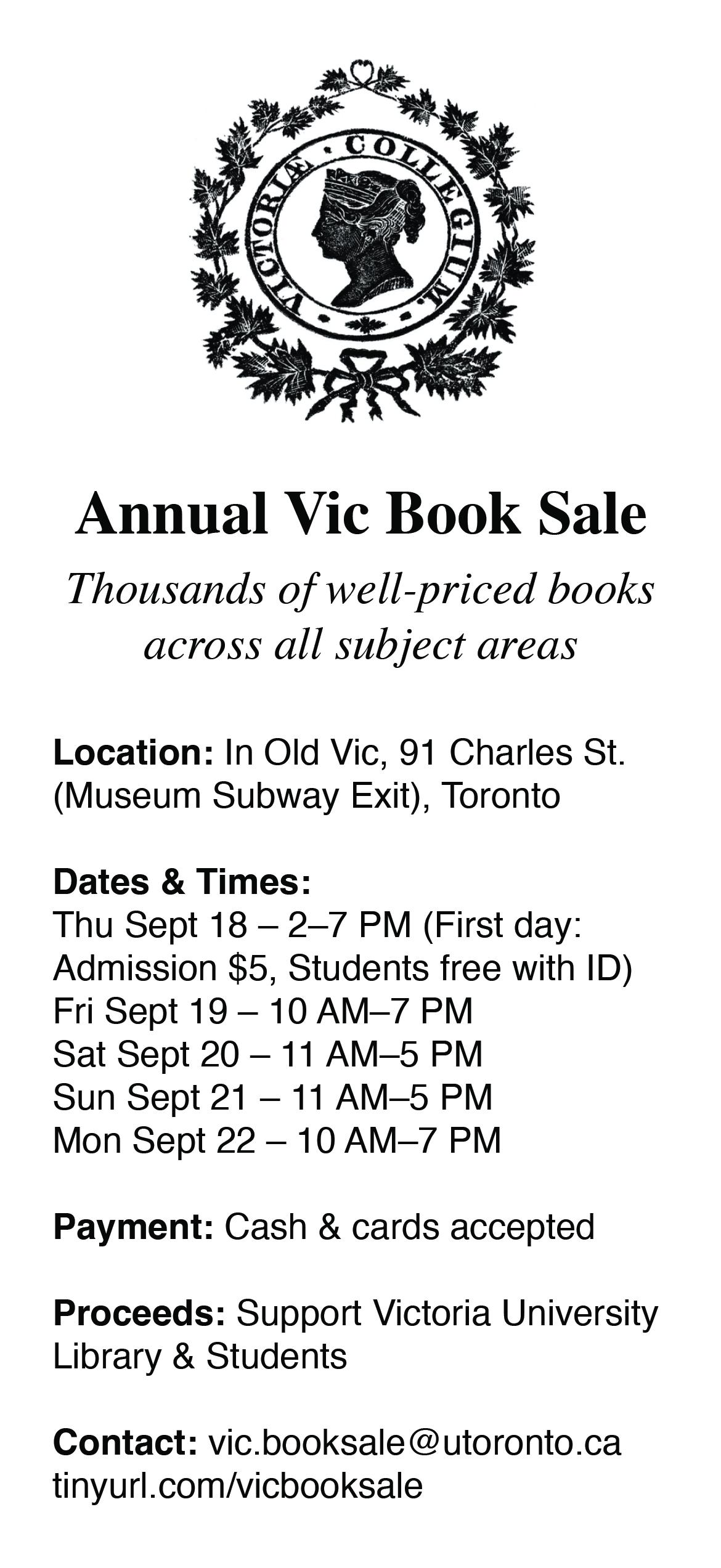
The Eyeopener Masthead

Editor-in-Chief
Negin “She’s Back” Khodayari
News Editors
Shumaila “InDesign” Mubarak
Vihaan “Sassy” Bhatnagar
Damola “Subheadings” Omole
Arts & Culture Editor
Lama “Bubble Tea?” Alshami
Business & Technology Editor
Jerry “-70 Kern” Zhang
Communities Editor
Daniel “La Do Do” Opasinis
Features Editor
Edward “French Vanilla” Lander
Fun & Satire Editor
Dylan “Preggo?” Marks
Sports Editors
Jonathan “Save Draft” Reynoso
Victoria “Lingo” Cha
Production Editors
Jasmine “Frozen” Makar
Sarah “Go To Sleep” Grishpul
Photo Editors
Ava “Triple Threat” Whelpley
Rachel “Iced Coffee” Cheng Pierre-Philipe “K-pop” WanyaTambwe
Media Editors
Divine “Dish Guy” Amayo
Lucas “Copy Editor” Bustinski
Digital Producer
Anthony “Rum & Coke” LippaHardy
Circulation Manager
Sherwin “In Shambles” Karimpoor
General Manager
Liane “Death to Danny” McLarty
Design Director
Vanessa “And Thats Why I Hired
Her” Kauk
Contributors
Liana “Slightly Ajar Door” Yadav
Harsh “Best of luck” Kumar
Daniyah “Deadline?” Yaqoob
Eli “Kiss” Silverstone
Hannah “Ace” Sabaratnam
Charlotte “Double Agent” Ligtenberg
Evan “First-in” Perry
Omolegho “Pin-it” Akhibi
Gray “Petri Dish” Moloy
Myrtle “Labubu” Manicad
Ella “Raw Sewage” Miller
Sorousheh “Future News Editor”
Salman
Garrett “Might Steal Our Jobs” Raakman
Melissa “Sony” Poenadi
Ashley “Free” Katshunga
Victoria “Pizza” Andrade
Joshua “Salad King” Chang
Blue “World Series” Jays
Jack “Sweetie Pie” Kauk
By The Eyeopener
Since Oct. 7, 2023, the genocide in Gaza has become not only a humanitarian catastrophe but a war on truth. Journalists, medics and witnesses have become deliberate targets.
Killing journalists is not a tragedy of war. It is not collateral damage. It is a war crime.
As of September 2025, the number of journalists and media workers killed in Gaza alone has surpassed 240, making it the deadliest documented conflict for journalists, according to the United Nations (UN) and Committee to Protect Journalists.
Among the most recent examples: the Aug. 25 Israeli strike on Nasser Hospital in Khan Younis, which killed at least 20 people, including five journalists. The strike is suspected to have been in two parts—known as a ‘double tap’— the first bomb hit, and the second followed just as medics and reporters rushed to help.
This is not an anomaly. It is part of a pattern—one that increasingly resembles a war on documentation itself.
Journalists are targeted in war because they get in the way. Their job is to document what those in power want hidden—civilian deaths, demolished hospitals and war crimes. Their work threatens official narratives. This type of attack is the most extreme form of censorship. It disrupts the public’s right to know and cuts off communication from those living under siege.
When documentation is targeted—whether through murders, internet blackouts or the destruction of newsrooms—the truth is not just obscured, it is erased.
Journalists are civil servants. Their job is not to take sides, but
to let the facts speak for themselves. We rely on reporters to verify numbers, challenge claims and hold power to account. When independent media is silenced, misinformation thrives. In Gaza, where internet access is routinely cut, and foreign media are barred entry, the risk of distortion is not hypothetical—it is already happening.
“We rely on reporters to verify numbers, challenge claims and hold power to account”
Article 79 of the 1977 Additional Protocol I to the Geneva Conventions formally protects journalists as civilians. The law is clear: as long as reporters do not take part in combat, they must be granted the same protections as any other civilian. But on the ground, that protection has not held. Dozens of press vests have been found next to bodies. Camera lenses smashed in bombed-out buildings.
Beyond Gaza, Israeli strikes in Yemen have expanded the war zone and further endangered the press. An air raid in Sanaa and AlJawf on Sept. 11 killed 46 people, including 11 journalists, and injured 165 civilians, according to Reuters. Several Yemeni newsrooms reported that entire offices were wiped out. Apart from threatening the media, these attacks risk escalating a broader regional war and signal a dangerous willingness to expand the conflict beyond Gaza’s borders.
Back in Gaza, the crisis continues to worsen. On Sept. 13, at least 32 Palestinians—including 12 children—were killed in an overnight Israeli bombardment on Gaza City, according to the CBC. Outside of deliberate attacks, famine is
now also claiming lives. Al Jazeera reported hunger-related deaths in Gaza as of Aug. 27 had risen to 313, including 119 children. The medical system, already on the verge of collapse, cannot cope.
The total documented death toll in Gaza since October 2023 has exceeded 64,000 as of Sept. 15, with many still unreported.
The toll for documented Israeli civilian deaths is just under 2,000.
The UN declared on Sept. 16 that Israel is committing genocide in the Gaza Strip in retaliation for an attack from Hamas which killed 1,195 Israelis on Oct. 7, 2023.
With Israel banning foreign media from entering Gaza, it is local reporters who carry the burden. They film, photograph, verify. They upload videos through intermittent internet.
They speak to mothers searching for sons under rubble, to surgeons operating in corridors.
And many of them do so until the moment they’re killed.
“Their press vests didn’t protect them. Their cameras didn’t make them bulletproof”
Take Anas Al-Sharif, a reporter killed by an Israeli drone strike on Aug. 10 while sheltering in a tent clearly marked as a press space near Al-Shifa Hospital. His death was confirmed by Al Jazeera and added to the list of the network’s killed staff.
It’s not hyperbole to say truth is being targeted.
This is a moral emergency. There is no more grey area.
The world must demand independent investigations into the attacks on media personnel. When the same patterns repeat—
journalists killed while sleeping, while sheltering, while working—it becomes systemic.
And the purpose is clear: to ensure that the world cannot see what is happening. To prevent documentation. To erase the record. Because if no one survives to tell the story, the crime can be buried with the victim.
Because to lose journalists is to lose history.
“It’s not hyperbole to say truth is being targeted”
But truth is not only threatened by bombs and bullets. It is also endangered by those who exploit their platforms in the name of justice but fail to commit to transparency, fairness or accountability.
As the genocide enters its second year, over 200,000 Palestinians deaths and injuries have been documented, according to The Guardian. The estimated toll is much higher, exceeding 600,000 according to The Canary. In contrast, as of Sept. 10, the number of documented Israeli deaths is 1,660, according to the UN. And among the dead are hundreds of people who held cameras instead of weapons, notepads instead of shields. Their press vests didn’t protect them. Their cameras didn’t make them bulletproof.
Truth is under attack—and the world cannot pretend it didn’t see it coming.
We at The Eyeopener stand in solidarity with the journalists killed by Israel while they were bearing witness to history. We call for an arms embargo and independent investigation into Israel’s war crimes.

TMU students and Indigenous vendors reflect on what it means to honour the earth at this year’s powwow

By Ava Whelpley
Toronto Metropolitan University (TMU) hosted a Pwaaganigaawin/ powwow on Friday in the Kerr Hall Quad, bringing together Indigenous people from across Turtle Island to celebrate through dance, music and tradition.
According to an older version of TMU’s Pow Wow website, the powwow began on Oct. 17, 1998, hosted by the former Ryerson Aboriginal Student Services, which is now named Gdoo-maawnjidimi Mompii Indigenous Student Services (GMISS).
The powwow took a 21-year break after its initial introduction, and resumed in 2019. It then took place online during the COVID-19 pandemic but continued in-person in 2023.
Tess Roorda, a second-year psychology student at TMU explained what intrigued her to come check out the powwow. “I was hearing the music from my class in Kerr Hall, and I thought it sounded really cool,” she said.
Another student, Venus Khoramrokh, in her first-year of social work, happened to come across the powwow while walking through
By Daniyah Yaqoob
It is no secret that politics can elicit deep emotions, such as anger, sadness and joy. As political tensions rise around the world, students are figuring out how to navigate their personal relationships.
A study from Mental Health Research Canada earlier this year found that nearly half of Canadians have experienced heightened anxiety. Among the top four reasons were “unpredictability” in Canada-U.S. relations and other global events, an indicator that politics plays an impactful role on many.
Students at Toronto Metropolitan University (TMU) are not immune to those political stressors. More than that, many of them accept that politics are intertwined with their existence and therefore, will have personal impacts on them—from how they conduct themselves to who they maintain relationships with.
Ella Oladipo, a second-year language and intercultural relations student at TMU, said her politics are integral to who she is.
“I don’t separate my political leanings from my values because
my values inspire my political leanings,” she said.
Oladipo considers themself a decolonial activist and supports love and care for all. But, they said, that doesn’t mean they will hesitate to cut someone out of their close circle over differing political views.
They had made good acquaintances with a peer from a politics class. As Oladipo sat in the Service Hub area on campus with a few other peers, the conversation turned political in nature and quickly heated from there. It was then that their classmate said, “racism is just a buzz word,” and later, “Donald Trump is not a racist.”
Oladipo said it was jarring to hear those words come out of her classmate’s mouth. It made her come to the conclusion they couldn’t continue a relationship any further.
“I don’t feel like I’d be safe around you because, in a moment that is evidently racist, you might defend the racist,” she said.
Now, when she and the classmate walk past each other in the halls of TMU, there is a physical shift. She says her classmate doesn’t make direct eye contact
ally important because I feel like there’s this connotation about Indigenous people that we’re not here… I feel like having events like this, especially at a place like TMU that has students from all over the world, really showcases what Canada’s about and what it means to be Indigenous.”
You can find O’Hara’s work on her website, tanshiclay.com, and various social media platforms with the username tanshiclay.
The theme of this year’s powwow was “Honouring Mother Earth”, which prompted many to take time and reflect on the state of the world right now and how they can improve.
campus and took the opportunity to look around with her friends.
While the TMU Pow Wow brings together students on campus, it also hosts Indigenous vendors who sell their products in an arts market around the Quad.
“It’s really important now more than ever to really take care of the planet”
Emily O’Hara, a returning vendor at the powwow, who works with moose hide and beadwork, explained the importance of a powwow, “events like this are re-
Wyatt Wichert, a third-year social work student who had the role of cultural helper during the powwow and was part of the planning committee, explained how they decided on the theme.
“The idea kind of came from our water teachings day for National Indigenous Peoples Month and the importance of taking care of Mother Earth and how the waters are being affected right now with all the plastics…I think we all thought that it was a great idea to honor Mother Earth, especially with the climate change issues that are going on.”
Roorda acknowledged the work done by Indigenous peoples for the planet and said “Indigenous people
have been on that forever, far more than anyone else.”
Tammy Beers, a member of Rama First Nation and vendor at this year’s powwow explained that the work is not done, “we can all always look at what we’re doing and think, what can we do better?”
Beers described how she started to use paper for her earring cards after initially using plastic.
You can find Beers’ work on her website, neonbirchworks.square.site.
“It’s really important now more than ever to really take care of the planet and just be one with the earth,” O’Hara added.
Powwow’s are very important to Indigenous communities as they foster connection and bring people together, Wichert emphasized. They are equally as important for non-Indigenous people as well, he said.
“I feel like there’s this connotation about indigenous people that we’re not here”
“It’s important that they see that we’re all different, that we’re all human, and that to learn the differences between our nations, our cultures and our communities, and it’s really important for people to find out people’s stories where they’re from,” said Beers.

with her anymore and Oladipo prefers the distance.
It’s not just a handful of students who are practicing cutting off from friends, family or professional contacts over political disagreements. An online survey conducted by Research Co. in March found that more than one third of the youngest adults in Canada would choose to abandon a person in their lives over differing views on federal politics alone.
Garv Gupta, a fourth-year computer science student, said they draw the line when someone disagrees on a topic that’s unquestionable to them.
In one class, Gupta met someone she could see herself hanging
out with outside of school. When the genocide in Gaza was brought up, she says her classmate openly defended the killing of women and children.
“I feel like that’s not political in the sense of like, it shouldn’t be something defendable,” Gupta said. After engaging in the short debate, Gupta stopped pursuing the friendship and cut communication all together.
There are situations where Gupta thinks it is possible to disagree with someone and maintain a relationship. In debates surrounding immigration, for example, she thinks there might be enough room for nuance and healthy disagreement to learn
from each other’s perspectives.
For students like Khalid Abdulwasi, a first-year politics and governance student, allowing political views to impact personal friendships makes no sense.
“People nowadays love to be around people who agree with them and not challenge them for what they say,” he said. “And that’s a bad thing.”
Abdulwasi thinks you need people who disagree with you in your circle and to be able to co-exist with them. As long as they are not forcing their views on you, he said, debates about politics can always be laid to rest.
Penicillium is another common type of household mould. The U.S. Centers for Disease Control (CDC) advises that all mould be treated the same in terms of removal.
Overflowing toilets, mould that makes students sick, bed bug infestations—horror stories from TMU’s largest and most troubled residence
Words by Ella Miller
by Gray Moloy
liver Robbins was vacationing in Los Angeles when his nightmare began.
It’s February 2024 and he’s in the city of angels to support his girlfriend, a folk-pop artist, as she records songs with some big-time professionals. All he wants is to be her hypeman.
As the musicians around him jam out, Robbins feels his phone buzz. The Pitman Hall ‘floor six’ group chat, usually reserved for his residence advisor’s (RA) announcements, is blowing up. It’s reading week—what could be going on that is so important?
The messages rolling in describe an “explosion” in one of the floor’s shared washrooms. A toilet is backing up sending foulsmelling water cascading out of the washroom and into the surrounding rooms.
Robbins, the now third-year journalism student, does what anyone would do in this situation: laugh at the poor schmuck who was stuck with the overflowing john and move on. But two hours after the initial message about the toilet, Robbins’ eyes are still fixed to the screen. A new message pings with a video clearly showing the numbers of the rooms flooding with ankle-deep sewage: 619 and 621—his room.
Pitman Hall had just claimed Robbins as its latest victim.
IN SEPTEMBER OF 1991, Pitman Hall opened its doors, welcoming throngs of students into its shining 14 floors and 565 rooms. It
was Toronto Metropolitan University’s (TMU) largest residence and maintains that title today. After the closure of O’Keefe House in 2018, which had only 30 beds, Pitman Hall became TMU’s oldest operating residence.
Nearly as long as it has been open, it has been the subject of criticism for its frequent sanitary and maintenance issues.
On the inaugural move-in day— which occurred a week late—exposed wiring and light bulbs dangling from their sockets greeted the students as they shuffled inside. Some students queued for over five hours just to get in the elevator.
The first complaints reported by The Eyeopener came in 1997, when incoming students claimed their rooms came with broken appliances, busted phone jacks and scratched desks.
2004 brought with it water leaks and cracked walls. Bed bug infestations were recorded in five different years. In 2007 a student moved in to find vomit stains on her bed, likewise in 2008 another student discovered the toenails of residents’ past still littering their mattress. Problems with appliances were rife—a faulty stove resulted in a severe kitchen fire in 2012. In 2014, cable television was abruptly cut off for all residents and a string of outages left students without water for hours at a time. In 2015, it was discovered that temperatures in the showers could surge to 56 degrees celsius, high above the legal limit.
In 2025, complaints are still rolling in.
SECOND-YEAR ENGLISH student Cameron Ross spent much of her first year asleep. After moving into Pitman Hall she began struggling with exhaustion, which worsened as her time in residence dragged on. When finals season hit, she could barely keep her eyes open, often waking up to start her days late into the afternoon. Ross is immunocompro-
mised and found herself exhausted and sick due to mould in her apartment style room.
She tested the apartment for mould in November 2024 with a store-bought kit, that’s when she started to feel “really, really sick,” she says.
“I was like, okay I think there’s actually something physically wrong with me because there isn’t a reason why I should be sleeping until six o’clock [p.m.] every day,” says Ross. I was so tired I couldn’t get out of bed.”
In photographs shared with The Eye, Ross shows a laboratory’s worth of petri dishes arranged along her countertop. Inside them are a zoo of orange and grey mould blooms, each labelled with “shower,” “furnace” or “bedroom.” The test identified some as black mould and
Ross contacted maintenance about the mould and they came to her unit with a bucket and a scrubbing tool, cleaning the tile walls of her shower. They also replaced the air filter in her bedroom. However, according to Ross, maintenance never addressed the root cause of the mould. When maintenance wiped their hands clean of Ross’ room, there was still “fur” growing from the wooden bench affixed to the side of her shower stall.
In an emailed statement to The Eye, the university said they hire an external specialized company to clean fan coil units two times a year—once prior to students moving in and once during the mid-year break.
One of Ross’ lifelines during her time in residence were the friends she made on her floor, one of whom is now her roommate at her new off-campus home.
When maintenance wiped their hands clean of Ross’ room, there was still “fur” growing from the wooden bench affixed to the side of her shower stall
One evening, one of these floormates was suffering from a medical emergency.
The girl had recently sustained a concussion and was displaying neurological symptoms that Ross feared indicated another head injury.
Doing what had been ingrained in her from a young age, Ross dialled 9-1-1. When the paramed-

others as penicillium.
According to Health Canada, black mould commonly grows in damp conditions or spaces without proper ventilation. People with chronic illness or compromised immune systems can experience what’s called mould toxicity, a condition characterized by symptoms like sinus, eye and skin irritation, difficulty breathing and fatigue.
to the desk immediately after showing the paramedics to her friend, but staff would not budge. The first responders would not be granted entry, they told her.
“The firefighters had to scream at [the desk attendant] and we just went against her wishes. They were trying to make me stay back and let the firefighters just figure out where my friend was. They would not let me escort the first responders to the issue.”
Ross eventually forced her and the paramedics’ way through the front desk area and into the elevator. Her friend was sent to hospital for what was determined to be an anemic episode and Ross was asked to attend a meeting with Housing & Residence Life to discuss the incident.
“After the incident, I was told by security that I should have called them instead of medical professionals because they are trained in the exact same way as paramedics, which I did find out after the fact was untrue,” says Ross.
In an emailed statement to The Eye, the university said that “some of TMU’s full-time frontline crew members also have advanced medical knowledge, including: Emergency Medical Responder (EMR) training.”
EMRs are equipped to provide some out-of-hospital care in medical emergencies, however EMRs cannot replace the role of Emergency Medical Technicians (EMTs) or Paramedics. The university did not share how many TMU Security staff members are trained as EMRs.
“When I explained to them what happened [Housing & Residence Life] said that I should have called them instead,” says Ross of the later meeting with management. “They said that they would have called the ambulance, but I was like, why? Am I incapable of calling 9-1-1? I’m an adult.”
According to the university’s statement, “Residence staff are trained to call 9-1-1 if any situation in residence is emergent or requires emergency medical response.”
As previously reported by The Eye, similar advice was given to another student almost 20 years ago when he was assaulted by an RA in Pitman Hall. Management seems to hand down the same edict: don’t involve outsiders, call security.
ics arrived, Ross went down to the front desk to escort them to her friend.
Four firefighters and two paramedics responded to Ross’ call. When Ross burst through the elevator doors to let the first responders up to her floor, the front desk attendants refused to let them up. Ross tried everything she could, promising to come back
wanted Pitman Hall to avoid the common pitfalls of other university residences. His firm, Strasman Architects Inc. (SAI), designed Pitman Hall for the university in 1989. The building was built by nowdefunct ACME Building and Construction Limited. Mechanical and electrical, as well as structural engineering were contracted out to other companies, both of which have now been bought out by larger firms. Strasman—who is perhaps
the least responsible for Pitman’s current state—is the last man standing.
Sitting in his office, he and his colleague, Arash Eshghpour, sift through photographs and project proposals from Pitman Hall’s design process. Strasman began his career idolizing the work of Ron Thom and working under Arthur Erickson, two titans of Canadian architecture, both of whom worked on major projects in education. Strasman tears through these references with a gleaming wit as Eshghpour clickclicks through an extensive digital archive of all of Strasman’s work.
This collection includes everything from private residences to transit projects—which are now SAI’s forte. When asked why he made the leap to university residences with Pitman Hall, Strasman simply stated that in the early days of SAI, they wanted to design “everything and anything.” When it came to Pitman, Strasman’s own time as a student in the architecture program at the University of British Columbia (UBC) influenced his decision to take on a university as a client.
Though Strasman lived at home, he visited friends in the student residences at UBC. He abhorred the buildings’ long corridors lined with dozens of small, cell-like rooms.
At Pitman, sociability would take centre stage: concentric spaces that encouraged students to gather and introduce themselves. He placed common areas in the middle of hallways—naturally guiding students into social spaces.
“If it’s behind a door, you don’t know whether you should knock or open the door and go in,” says Strasman about the building’s common areas.

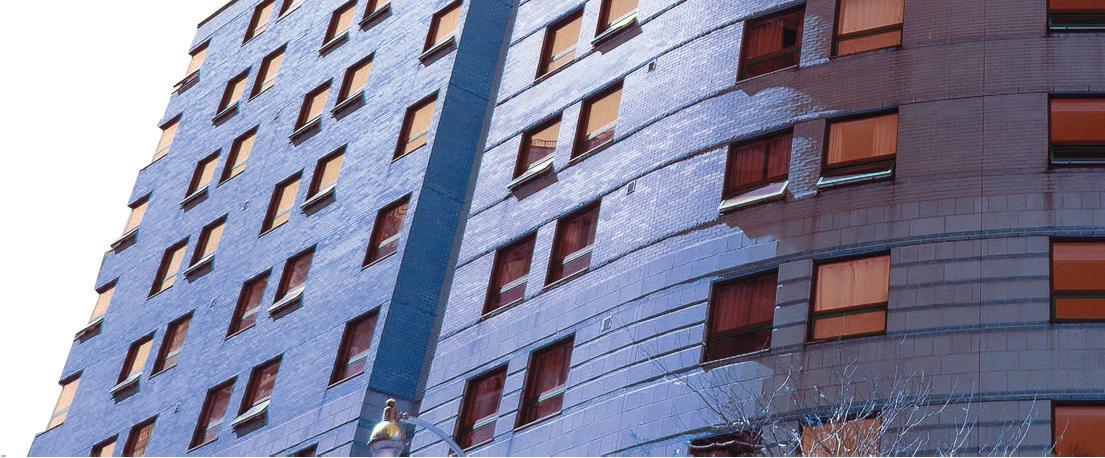
tents of the bag were exactly—it was thrown out before he got back.
“I don’t get too sentimental with my clothes, but some of my favourite sweaters were in there and I’ll just never see them again because they got pooped on at Pitman Hall,” says Robbins.
Robbins was never provided with an itinerary of what was tossed in the garbage. The items that remained were heaped into a pile on his bed when he returned, including his guitar, the neck of which protruded from under a discordant tangle of bedsheets and grocery bags.
“Some of my favourite sweaters were in there and I’ll just never see them again because they got pooped on at Pitman Hall”
From his perspective, Pitman Hall’s construction went swimmingly—the only compromise he made was removing the balconies from his original plan due to fears from the university that students would throw things off of them.
Once Strasman’s design was approved, his involvement ended. ACME and the contractors took it from there. The university told him construction went smoothly. Until his interview with The Eye, Strasman had never met someone who lived in Pitman Hall.
BEFORE ROBBINS HAD LEFT for Los Angeles he did his laundry, leaving a bag of clean clothes on his floor. During the flood the bag became saturated with dirty brown water. Staff made the executive decision to dispose of the bag. To add insult to injury, Robbins isn’t even sure what the con-
The only other person on floor six affected by the flooding that Robbins knew was his next door neighbour who he had never spoken to, but had a habit of staying up until 5 a.m. screaming at his video games. If his console was left behind that fateful reading week, Robbins suspects this won’t be an issue anymore.
Though it was Pitman Hall’s plumbing that was to blame for


the damage, Robbins did not receive compensation because he had not taken out tenant insurance for his unit. Housing & Residence Life requires all residents to obtain tenant insurance to cover the loss or damage of personal property and encourages coverage with an “all-risks” basis.
Though Robbins is aware this decision meant he’d incur the costs, he still sees what happened as unacceptable.
“They should be paying me insurance, hello?” retorts Robbins in his interview.
Housing & Residence Life offered Robbins a new room in the International Living/Learning Centre (ILC)—he wasn’t interested. He felt the university did not care about him and spent the rest of the year sleeping at his girlfriend’s parents’ house in North York.
Robbins had spent the previous year at Carleton University (CU) for political science before transferring to TMU for journalism. He lived in residence at CU with a roommate, a window that wasn’t facing another building and management that—according to him—cared about his problems.
SO MUCH OF THE RESIDENCE experience falls on the shoulders of

RAs. They’re the ones who update group chats about monthly meetings, who stay up late at night to patrol the hallways, host events and help first-years amble through rounds of icebreakers during Frosh. However, there’s a catch—RAs are only given a yearly allowance of $100 to facilitate it all.
“Tell me, what can I do for $100 for 40 people? Not much,” says John* a fourthyear student and RA thrice over. “Not much for the nine events that I’m supposed to run a [year]. People don’t come to events if there’s no food, people don’t come to events if there’s nothing.”
highly competitive market.
He knew that being assigned to Pitman Hall meant being prepared for exploding toilets and knowing which numbers to call to report mould.
John says the discrepancies in working conditions between the residences are apparent—and incoming RAs are often disappointed when they find out they’re being placed in Pitman Hall, rather than, say, Daphne Cockwell Complex (DCC).
The Housing & Residence Life website states that Pitman Hall is accessible. The building was designed prior to the Accessibility for Ontarians with Disabilities Act which was legislated in 2005. In a statement to The Eye, the university said students with disabilities are placed in residence halls that can accomodate their specific needs. The university did not specify which residences accomodate which needs, only that DCC is fully wheelchair-accessible.
After his time working closer with the management, John sees Pitman’s bottom line as the main cause of its woes.
“It all comes down to funding. I think we just don’t have enough funding in housing to address issues properly,” he says.
Mendes has only lived in Pitman Hall for three weeks. Within the first week alone she and her roommates called maintenance eight times.
Prior to becoming an RA, John lived in Pitman Hall where he had a mostly positive experience— save for an instance of flooding in January of 2022 and mould on the window of his room. As an international student, John needed a place to live to keep his student visa. He made the decision to return as an RA rather than try to secure housing in Toronto’s



Strasman, five decades into a career with buildings, agrees.
“Like any institution, they’re always hurting for money,” he says. “If there was a constant, endless supply of money, maintenance would not be an issue. But there never is and there’s never enough to cover maintenance.”
FIRST-YEAR MEDIA production student Lily Mendes chose Pitman Hall because she heard that it was the social residence. She toured the building before selecting it as her first choice on the ranked ballot system that Housing & Residence Life uses to assign students their dorms. Mendes thought she knew what she was getting herself into. Though it may have been rough around the edges, in Pitman, she would surely make friends.
“I don’t think it’s going to be like The Ritz for college dorms,” she says. “Definitely not the cutest but we can make it work.”
Mendes has only lived in Pitman Hall for three weeks. Within the first week alone she and her roommates called maintenance eight times for a menagerie of issues— faulty door locks, a broken stove, flickering lights and a clogged toilet. At Pitman Hall, some things never change.
*This source has requested to have his name omitted. The Eyeopener has verified this source.
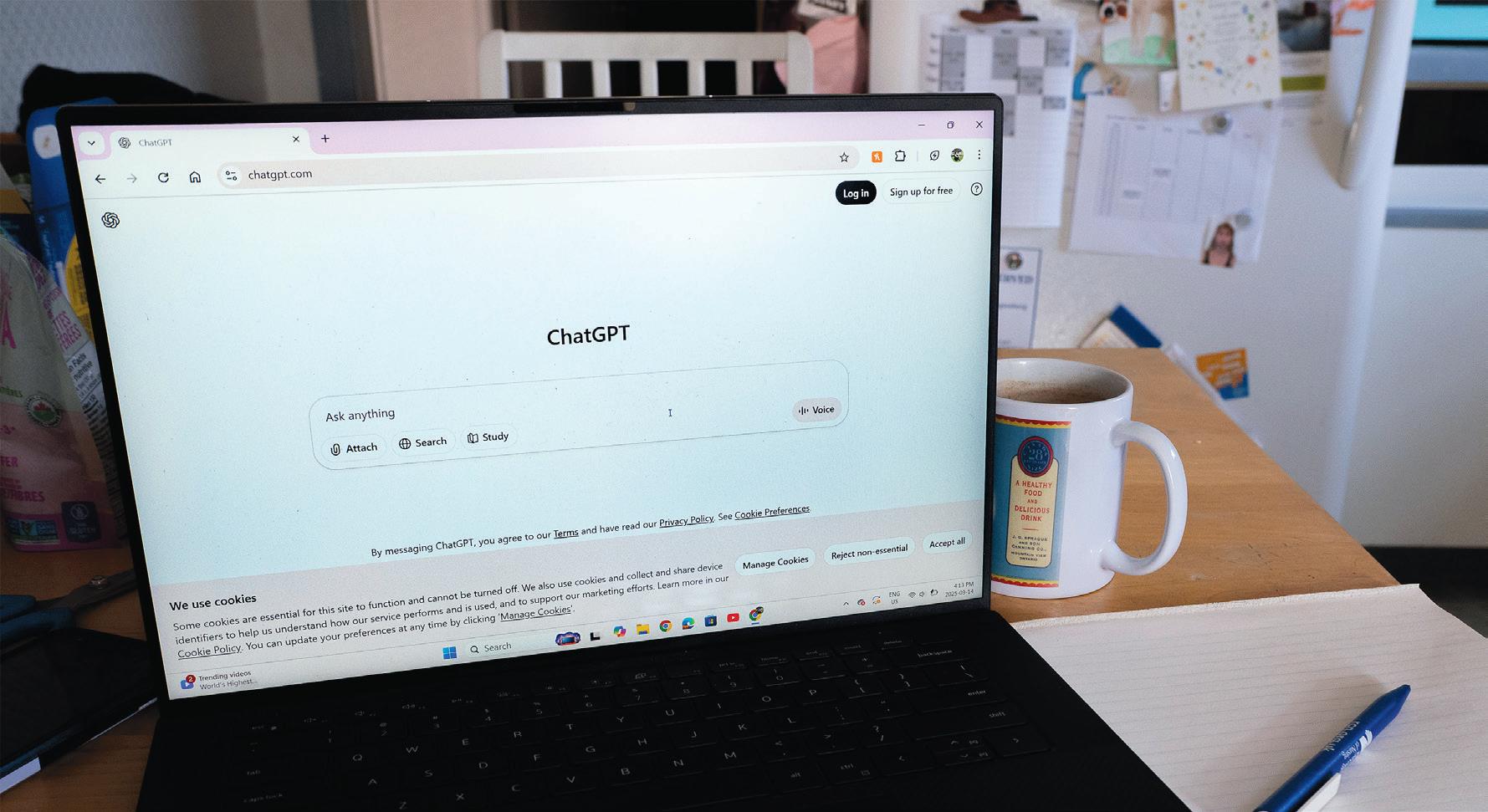
By Liana Yadav
Writing is intuitive. It’s at its best when it comes from the heart. Great literature is not great because of the complexity of words or the length of sentences; it is great because it stirs something in the reader and imprints into their mind. In a sense, we all have been writing
our whole lives. Essays, emails, long-winded text messages, love letters, dating app prompts, Instagram captions—we can claim these collections of words as our own.
Unless of course, they aren’t.
Artificial Intelligence (AI) has permeated much of the digital world. Embedded within online tools we use in everyday life—
By Daniel Opasinis
After a summer packed with fleeting trends, students at Toronto Metropolitan University (TMU) are back on campus. Labubus, Dubai chocolate and matcha were just a few words that took the internet by storm over the break, none of which come at cheap prices.
Initially introduced in 2015 as part of a series of picture books by Hong Kong artist Kasing Lung, according to manufacturer Pop Mart’s website, Labubus have since been adapted into the popular plushies that rapidly gained popularity online.
The cheeky creatures are one of many blind boxes—mystery capsules that upon opening, give collectors a chance to find a unique item within.
Third-year politics and governance student Omar Fedawy has spent his summer online, watching the Labubu frenzy from afar.
“It’s nice but I would pay maximum 30 bucks for something like that, not these massive amounts of money. Like, where does this money go?” he said.
Labubus retail on the Pop Mart website for $30 to $40 but can be found through resellers for over
$100, not to mention special variants of the doll reaching over $500.
As an international student from Egypt, Fedawy says he is swamped in too many student fees to bother buying trending collectibles. “Instead of paying $400 on a toy, I could use the same $400 to grow something in myself, because things like these [Labubus] just go away,” he said.
Fedawy said he used to feel a sense of loneliness not engaging in the same trends as those around him but that feeling has recently faded.
Zorianna Zurba, a professional communication professor at TMU, says Fedawy might not be so alone in this feeling.
“We’re going out and buying something that we have a general sense of what it is, but we don’t actually know what’s inside the box, right?...We like the idea of what this thing is, we get this added surprise,” she said.
Zurba said Labubus, and blind boxes more generally, provide an element of chance that makes your purchase a gamble. These items “infuse the mundane with a little bit of magic,” she explained. “We’re sort of seeing something similar to what happened with
times, a violation of academic integrity and other times, an important tool encouraged in classrooms, AI is posited to us in different ways depending on who we talk to.
After spending this summer working on my own creative writing project, publishing articles on Substack, coming back to university to discourse on a technology I have actively tried to stay away from in my writing has been a challenge.
Writing for my newsletter, slightly ajar door, on Substack these past few months was a way for me to explore my own mind. I kept the name ambiguous so I could allow myself to explore every topic, keeping the door to every room of knowledge slightly ajar.
This meant that I wrote longform essays on topics such as the feminist movement in South Korea, the loss of nuance in the digital age, the history of gossip and the need for fiction in a world where stories drive more hope than reality.
Meta AI, Google Gemini, Microsoft Copilot—it is marketed to us by their parent companies as a friendly companion that improves our efficiency at no real cost.
As a student myself, the discourse around AI has felt overwhelming over the last couple of years because of the constantly changing attitudes around it. Some-
It helped me reckon with some truths I often find disturbing, such as the commodication of my attention and its visceral effects on my still developing pre-frontal cortex —but also find hope in these areas.
When I let myself do something creative with volition and not for academic validation, I was finally able to explore places my brain takes me when not forced to rush a
dopamine hit or achieve a quantitative goal. The process was often messy and taxing, which made hitting publish at the end of the week all the more rewarding.
Dale Smith, a professor and undergraduate program director in the English department explains that writing gives us possibilities to determine our outlook towards life. It’s a way of “encountering yourself in new ways and also connecting that self to a larger cultural or historical reality,” he said in an interview with The Eyeopener Writing has always been a way to attain self-expression, and with the ability to outsource this activity, some professors believe students are losing important skills that are needed beyond university and work. “I notice a lot of AI generated work coming in, which makes, from a teaching perspective, everybody quite exhausted and [apprehensive],” said Smith.
“We’re in a complicated period and I think one of the dangers of AI is it produces an illusion of knowledge and information,” he added. Shortcuts may get you to your destination, but they significantly change your journey. A study by Cornell University on GPT-3 found that the chatbot produces misinformation up to 26 per cent of the time.
Read more at theeyeopener.com
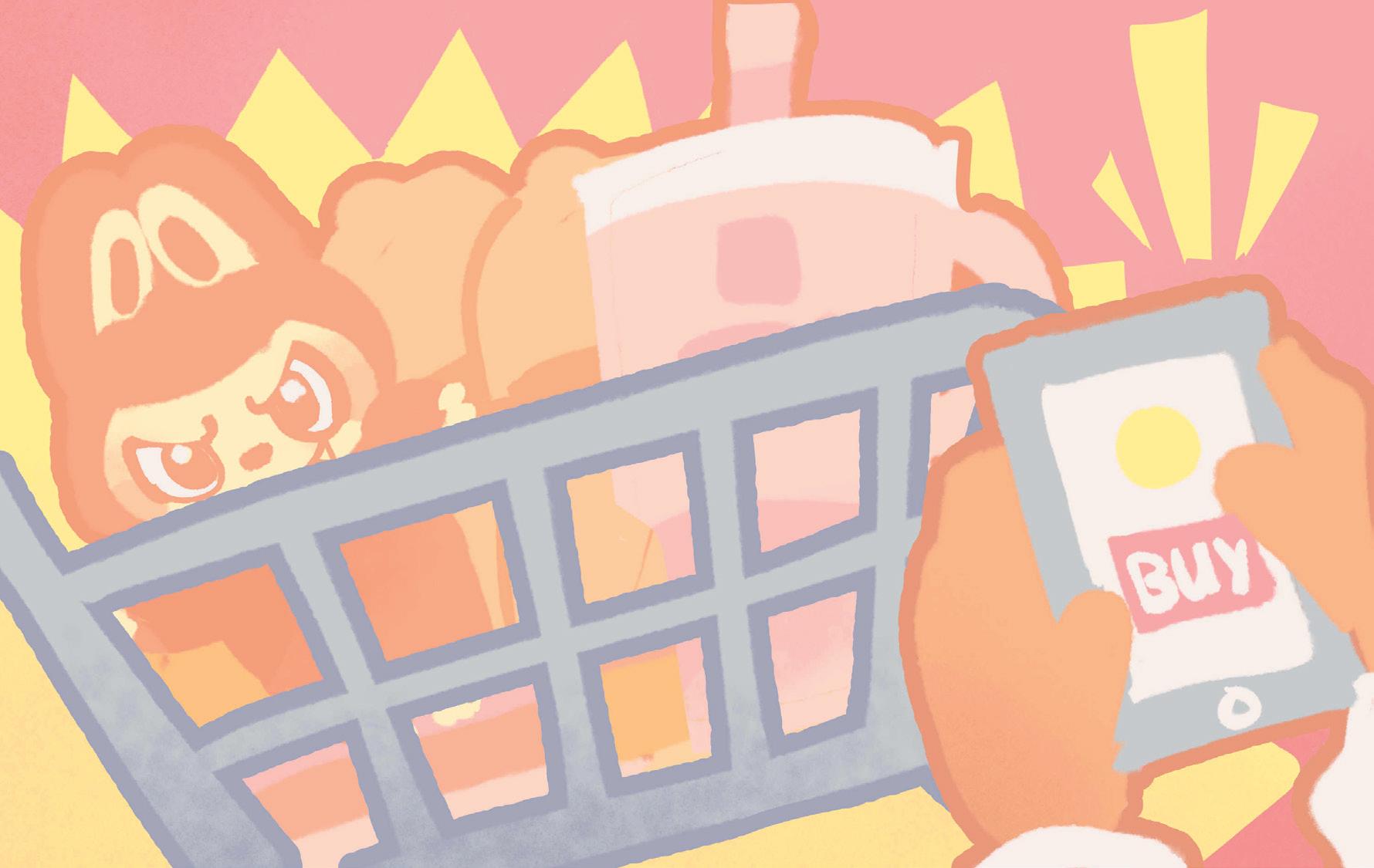
the beanie babies,” she said, explaining that resellers marking up the price of in-demand merchandise is nothing new.
Abi Junop, a second-year performance production student, says she is an avid collector of trinkets like the Labubu.
“I think I’m a good median for what the average, chronically online person is watching,” she said.
Although she’s never bought a Labubu, Junop says she owns knock-off Smiskis, another blind box character. “I completely understand collectibles. They’re adorable. And it kind of puts you in ‘the know,’ or in the ‘it crowd,’” she said. Zurba said this “it crowd” is a real thing.
“You can be a fan, for example, of the Blue Jays simply by keeping tabs on the score. You can be a fan of Taylor Swift by knowing all her songs and listening to her on the radio. These are all low cost measures to fandom,” she said.
Since Labubus have a visual indicator—as many people will clip them to their bags—it’s immediately obvious if someone is in on the culture, she explained.
Junop said as a high school student, she felt comfortable spending money on collectables. “I felt completely okay dropping $1,000 over two years because they were things that made me happy…I liked the community that came with it.”
As she’s come into university
she said those funds feel better allocated towards rent and food. “I just can’t really justify it, so I’ve been learning to be content with what I have.”
In recent years, according to Zurba, steadfast trends that cater to the need of the time have slowly shifted to microtrends—shortlived fads that piggyback on a viral topic. To combat the overconsumption that comes with microtrends, Janop said she calculates how long it takes for her to work for an item. “If an item is 60 bucks, is this worth three hours of my labor?”
Fedawy said, “Life has way more meaning than just spending so much money that’s just gonna go in people’s pockets.”
ng the tone for her upcoming season with TMU
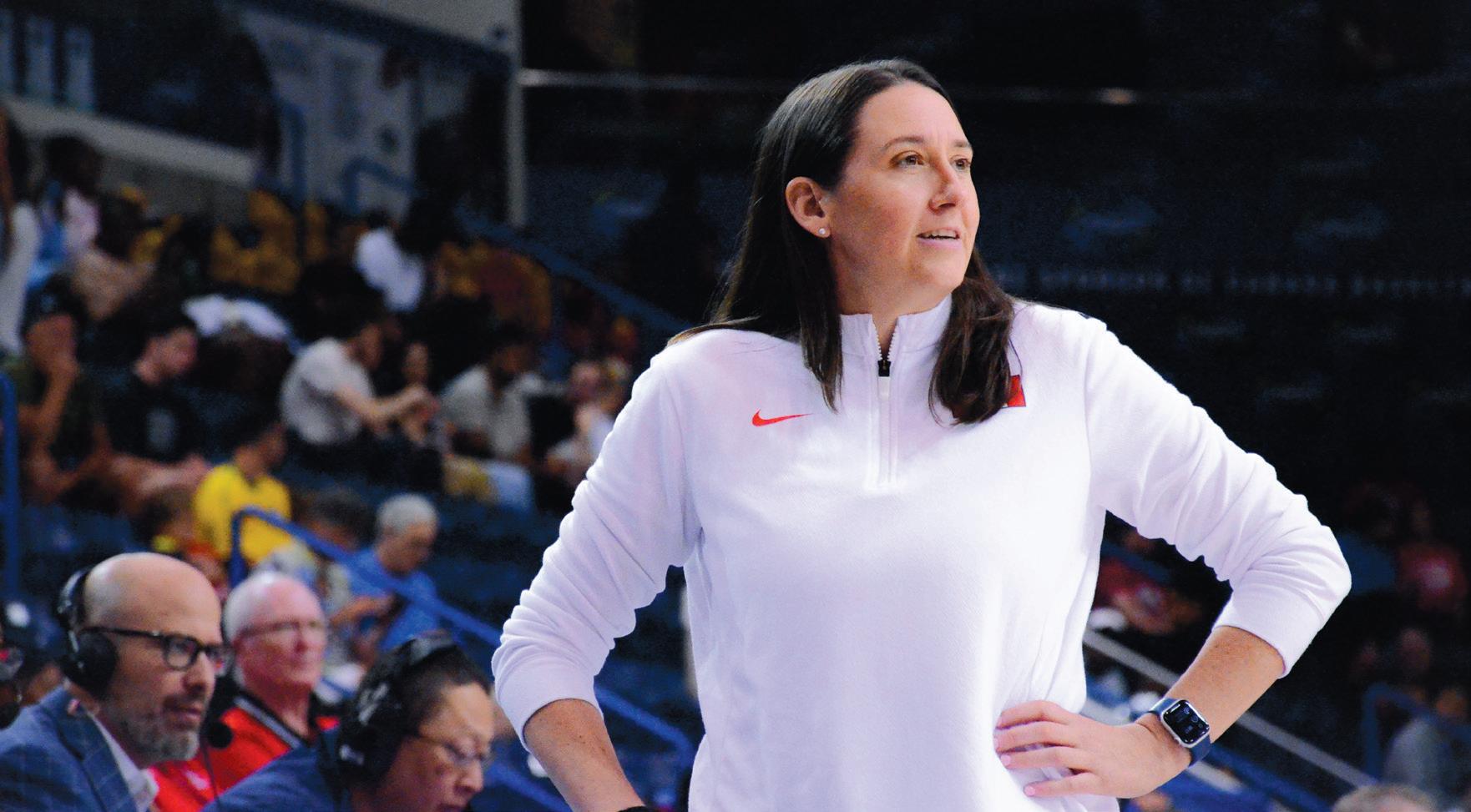
By Eli Silverstone
Toronto Metropolitan University (TMU) women’s basketball team head coach Carly Clarke continues to shine on the international stage—this time though, on a court she’s very familiar with.
Last month, Clarke led the under-23 (U23) Canadian women’s team to gold at the Globl Jam tournament, hosted at the Mattamy Athletic Center (MAC) from Aug. 13 to 17. The four-day tournament featured the best basketball players aged 23 years old and under from Canada, Brazil, Puerto Rico and the U.S., which was represented by the Texas Longhorns. This was Clarke’s second time as head coach of Canada in the three-year existence of the tournament. Canada has won gold both times with her at the helm.
Coaching on the international stage is not a new experience for Clarke in the slightest. But as Canadian basketball culture has grown over the past few years, being able to lead and win an event like Globl Jam continues to add to
Clarke’s career momentum. The veteran has travelled around the world to coach Canadian hoops, most noticeably serving as an assistant coach at the Summer Olympic Games, first for Tokyo 2020 and more recently for Paris 2024.
“You just constantly feel the energy and buzz around what’s going on with all of our teams and with the tournament being in Toronto, there’s a few more in-person interactions where you can really sense and feel that,” said Clarke.
Clarke’s team got out to a hot start, defeating Brazil 104-56 in their opening match. Canada’s second match-up of the competition was against Texas who were a one seed in last year’s March Madness tournament and made it all the way to the Final Four. Texas took the win 70-61 but Canada bounced back to beat Puerto Rico in group play and clinch a rematch with Texas in the finals.
In a close and tense championship game, Canada defeated Texas 72-65 on the back of tournament MVP Avery Howell.
“[Howell] demonstrated a great ability to adapt from the first time we played Texas to the second,” said Clarke.
Howell had 28 points and was a perfect six for six on three-point range in the championship match against Texas. She was also an alternate on the 2024 Canadian Olympic team, put on a shooting clinic, making a scorching 71 per cent of her three point attempts overall in the tournament.
“I’ve spent a lot of work on [three point shooting] so it felt good to see it pay off,” said Howell. “That’s what my team needed from me tonight and if I have any space I’m going to let it fly.”
While winning is always an objective, the young age of the players makes Globl Jam rosters keyed into development. The goal for coaches and leaders of the Canada Basketball organization is to have these U23 players contribute to the senior women’s team in the very near future. There’s an expectation that, despite the small amount of time Clarke gets with her team
before each game, they will win games and players will stand out.
“I think you’re able to [win and develop players] if you’re valuing and emphasizing the right things day-to-day in your training and competitive environment,” said Clarke who is the only coach to lead Canada to multiple medals at the FIBA U19 Women’s World Cup. “Ideally those values are meshing to what’s going to lead to success and winning in the end.”
A clear example of this process throughout the short four-day tournament was Canada’s point guard, Shayeann Day-Wilson. The electrifying Day-Wilson had been selected to Canada’s Globl Jam roster all three times and was expected to step into a leadership role for Canada.
“We want to really continue to try and work with her, develop her as a point guard and improve her decision making [to] be an offensive leader and facilitator for us,” said Clarke in a post-game interview after Canada defeated Brazil in their first game.
Three days later in the finals against Texas, Day-Wilson did exactly what Clarke was looking for. She was the primary ball handler and set the tone for Canada’s offense before eventually taking over the fourth quarter. She finished with 18 points, seven rebounds and four assists, with 11 of them coming in the fourth quarter off an array of difficult shots. The clutch performance down the stretch showed quick development from DayWilson and was crucial to Canada’s tournament win.
“That’s just confidence. That’s just believing in my craft. I’m in the gym everyday,” said DayWilson after winning gold. “We stayed together in the fourth quarter when it mattered...great team win overall.”
Being exposed to these international team situations where development and success are prioritized has paired perfectly with Clarke’s coaching skills at TMU. She was named the Ontario University Athletics (OUA) Coach of the Year in the 2021-22 season after the TMU Bold women’s basketball team won the OUA and U Sports championship. Since then, she has coached Canada in the inaugural Globl Jam tournament, the Olympics, Women’s World Cup, Americup and obviously last month’s Globl Jam tournament.
“Every national team gives different learnings, exposures, tactics that I want to try and implement in the university setting,” said Clarke. “And the same goes the other direction. Every university season gives me new thoughts and ideas that apply to how I show up for the national team.”
Last season, the Bold women’s basketball team went 18-6 in the regular season and made it to the OUA semifinals. It was a good year for the Bold and it matched up with the type of consistent success the program has come to expect under Clarke. The Bold have put together 11 straight seasons with a winning record under Clarke and this year’s team is quickly forming an identity to maintain their streak.
“I think we’ve got a pretty exciting dynamic group that will continue to play with pace and get up and down [the court],” said Clarke.
Globl Jam is expected to return to the MAC next summer and Canada will attempt to defend home court once again. The TMU women’s basketball team will play exhibition matches and tournaments before the regular season kicks off on Oct. 24 in Hamilton against the McMaster University Marauders before their home opener on Oct. 31.
Aft er mediocre
By Hannah Sabaratnam

Two club teams at Toronto Metropolitan University (TMU) are back in action. Both the TMU Bold softball and baseball teams are looking to improve upon their previous seasons and make deep playoffs runs in 2025-26.
Softball
The softball team made a handful of additions to their team including outfielder Tessa Di Matteo, shortstop/catcher Grayce Cooper, first basewoman Dani Di Giusto, second basewoman Sylvia Ignas, pitcher/outfielder Ava Marmorato and second basewoman Alexia Mitakidis. The only graduating player from last year’s squad was centre fielder second basewoman Abby Stuart.
Last season, the Bold did not
clinch a post-season berth—the only team in the East division to not do so—resulting in disappointment across the team. However, the team is motivated to come back and confident they can make a strong return to the field in October.
“We don’t want to have such an embarrassing ending like we did last year,” said fourth-year centre fielder/first basewoman Emily Bancroft. “We never want to feel that again.”
This year, the team is working to make improvements to their game. Poor offensive performances were an issue last season and are something the team is making a priority to change.
“I think if we can really focus on our offense, we’ll have a lot more success, and that’s what we’ve been
working on all throughout the practice,” said Bancroft.
The theme for the 2025 season is positivity on and off the field. Despite good defense, when an error occurred the team would “lose the inning,” according to Bancroft. The Bold want to work on changing their mindset and uplifting one another.
The theme for the 2025 season is positivity on and off the field. Despite good defense, when an error occurred the team would “lose the inning,” according to Bancroft. The Bold want to work on changing their mindset and uplift one another.
A new tradition the team has started this year is naming a player of the game.
Read more at theeyeopener.com

By Harsh Kumar
Despite a domestic tuition freeze in Ontario, the real cost of attending Toronto Metropolitan University (TMU) keeps climbing as students are face rising living expenses.
This years housing fees increased by four per cent and with mandatory meal plans going up five per cent, according to TMU Housing and Residence Life. The cost of ancillary charges, including health services and athletics, increased 2.8 per cent in line with Toronto’s consumer price index, the university’s 2025–26 budget shows. Meanwhile, food prices across
Canada are forecast to rise three to five per cent in 2025, according to the Canada Food Price Report. A recent survey by Embark, a provider of registered education savings plans, shows that amid economic uncertainty, nearly half of Canadian parents say it has affected their ability to save for their children’s education.
Students at TMU are feeling the squeeze as the rising cost of food, housing and ancillary costs make attending university in downtown Toronto increasingly expensive.
Farshid Jamal, a fourth-year graphics communications manage-
By Jerry Zhang
Toronto Metropolitan University (TMU) has approved a budget for 2025-26, despite earlier projections of a $13-million shortfall. Education experts say that TMU’s reliance on temporary funding reveals wider structural weaknesses in Ontario’s university funding model.
The 2025-26 Budget Priorities & Expenditures outline projects revenues will rise by 1.7 per cent or $11.9 million while expenses grow by 3.6 per cent or $24.8 million, roughly twice the rate of revenue.
TMU is currently relying on the Post-Secondary Education Sustainability Fund (PSESF), a fund aimed at maintaining the tuition freezes. This fund includes a $12.5-million across-the-board provincial funding plus an $8.5 million higherneed top-up for 2025-26, according to the TMU ‘s budget.
Glen Jones, a professor of higher education at the University of Toronto, warns that these supports are basically band-aids to mask deeper cracks.
“We have a huge structural issue… they do mask deeper problems,” he said, referencing the 2023 Blue Ribbon Panel, a report of advice and
recommendations ensuring the financial sustainability of Ontario’s post-secondary education sector.
The report found the funding model in its current form “was not sustainable,” explained Jones.
According to the Blue Ribbon Panel, Ontario only provides universities with about 57 per cent of the national average for provincial funding per student, which is $9,000 less than the rest of Canada’s average.
Jones pointed out that since 2019, the domestic tuition has been frozen without any increase in funding and was cut down by 10 per cent, taking out the flexibility of universities to adjust tuition in response to inflation or rising costs.
He adds that “the only source of new revenues from 2019 onwards were international student fees. In January of 2024 we saw the federal government introduce a cap, which reduced those numbers dramatically.”
A report by the Canadian Centre for Policy Alternatives, found that international students in 2021-22 made up nearly 19 per cent of fulltime enrolments in Ontario, but accounted for 48.4 per cent of all tuition revenue in the province.
Jamal, who works at a grocery store part-time, has also noticed the rising costs of shopping for groceries.
“I do look at the prices of ground meat and realize the prices are genuinely getting out of hand,” he said.
A report from Statistics Canada has found the per-kilogram price of ground beef is now $14.78, which is up 14 per cent from the price of $12.98 in September of last year.
Deeya Nassereddine, a thirdyear business management student at TMU, has noticed that something as simple as coffee has increased in cost.
ment student at TMU, talks about being priced out of some athletic activities amidst rising costs.
“I wanted to be a part of the callisthenics club at TMU but I realized the membership would be a little too high,” said Jamal.
The cost of athletics and recreation fees has gone up from $257.22 last year to $264.45 this year.
Jamal also mentions how the rising cost of food has made it more difficult for some students to enjoy a meal near campus. “$20 only gets you a decent-sized meal but back then would get you a lot more than a meal, you’d be stuffed,” he said.
“Coffee is not cheap anymore, I just went to Tim’s and my coffee was five dollars when it used to be two dollars,” said Nassereddine.
Much of the increase in the cost of living is felt by the international student community at TMU. They have not received the same tuition freeze as domestic students, on top of Toronto’s rising living costs.
Karim Elima Daoud, a third-year business management student at TMU, said “living here in the past year, it is definitely very expensive to be an international student. I think that is very reflective in the tuition fees that we pay.”
According to an emailed statement to The Eyeopener, the university explains that it faces revenue
constraints similar to other Ontario institutions, driven by limited government funding, inflation and enrolment changes.
“Our objective remains to implement a responsible budget that manages this uncertainty while focusing on strategic priorities, such as student experience, academic quality, financial support, and the safety of our community,” the statement reads.
Carolina Aragao, a researcher and economist at the Canadian Centre for Policy Alternatives, has looked at some of the issues facing post-secondary education in Ontario.
Through her work, she has found severe shortfalls in funding for post-secondary education in Ontario. While other provinces fund 60 per cent of operating revenue for schools, in Ontario, that number is 25 per cent.
“Ontario is the province that has the lowest per capita investment in post-secondary education in Canada, so universities in Ontario…receive significantly less funding than other provincial governments,” said Aragao.
While International students made up for some of the lack of funding, changes in immigration policy have only exacerbated the issue.
“Universities have used a lot of the enrollment tuition as a source of revenue, which is also now drying up,” said Aragao.

While tuition stays frozen, ancillary costs rose by almost three per cent at TMU, with residence fees increasing by four per cent and meal plans by five per cent in 2025-26. Inflation in Toronto was nearly three per cent in the recent Canadian Price Index.
Jones notes that student affordability isn’t just about tuition, it’s “whether the government funding under [Ontario Student Assistance Program] (OSAP) is increasing enough in line with costs.”
He argues that OSAP has not kept pace. According to the Blue Ribbon Panel report, many students have seen reduced amounts in OSAP grants since 2019. 79 per cent of TMU’s budget is directed to compensation such as salaries and benefits. Jones explains this split is in line with other uni-
versities in Ontario, however universities have little flexibility to actually alter their budgets, as collective agreements and contracts have locked in many of those costs over several years.
Jones explains when universities do decide to cut, they will be looking to “reduce the number of low enrollment courses and to increase class sizes in some areas. There may be program cuts eventually in areas where there’s less student interest and the number of admissions has been modest.”
An email statement from TMU said, “budget reductions focus mainly on non-salary expenses and vacant positions.” Jones warns that there are easy places to trim, but large cuts usually involve program changes, layoffs or service reductions and if done quickly may lead to “bad choices.”
TMU explained in the emailed statement that it has “taken a careful approach to achieve this balanced budget” focusing on protecting teaching, learning and research and maintaining student experience.
The university also confirms that their base budget reduction across the school is two per cent rather than the 2.5 per cent earlier indicated in the 2025-26 Budget Town Hall.
According to Jones, the combination of frozen tuition, limited domestic enrollment growth, rising costs and dependence on onetime funds means universities like TMU cannot sustain within the current system.
“We need more government funding,” he said. “We need to increase domestic tuition. I think it has to be a shared model.”
TMU announces new 10-step account verification system for all student accounts, and they’re all bonkers
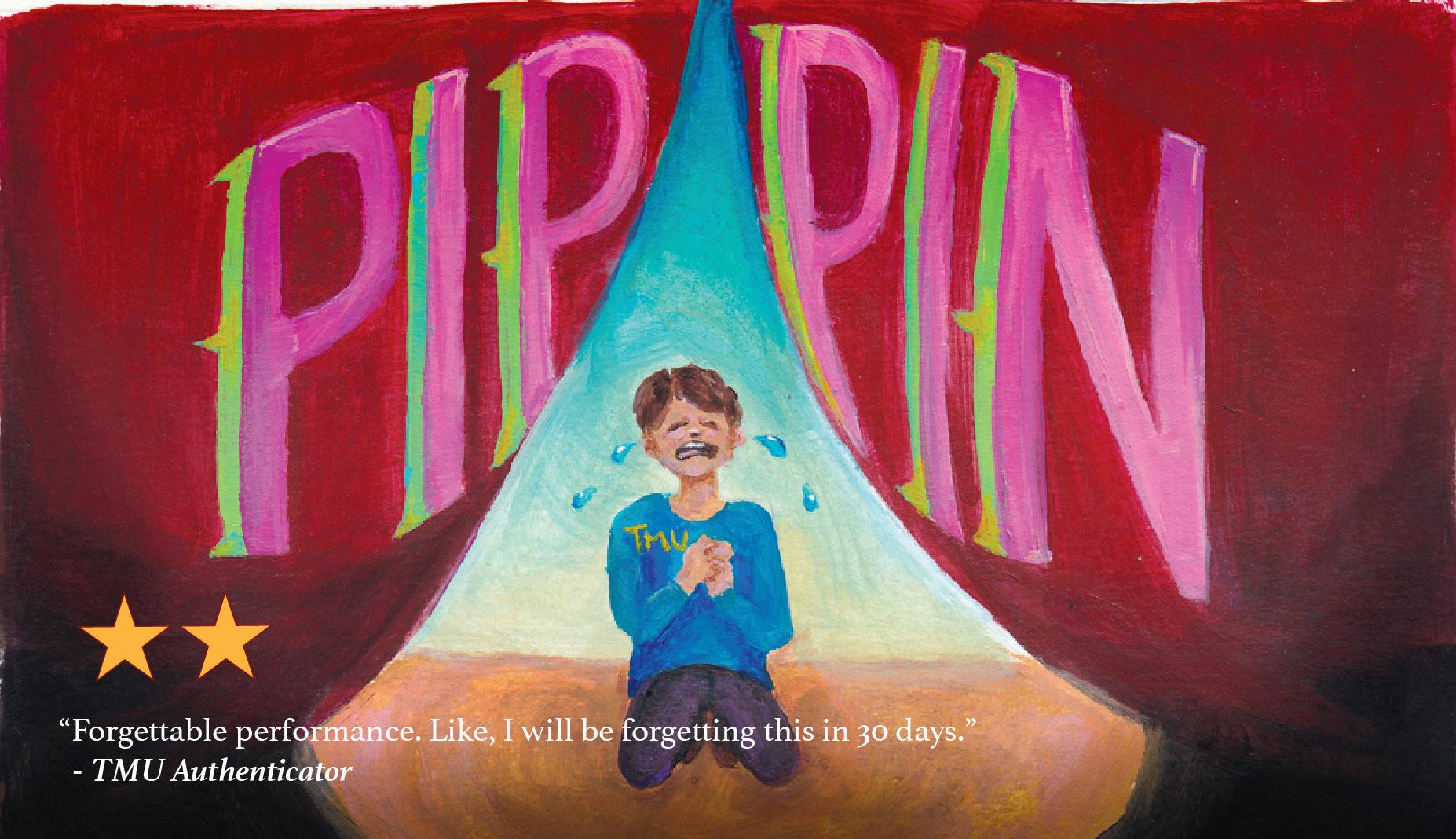
By Daniel Opasinis
Disclaimer: While the actual process of logging into your school account may feel this tedious, I assure you this story is almost completely made up, except for the parts that are actually true. Choose what you want to believe.
Google’s two-step verification process has terrorized students at
Toronto Metropolitan University (TMU) for years. However, things might just get worse as the administration has announced a new 10-step verification process to log into your accounts.
A representative from TMU said the new program, “GorillaGrip,” will lock down accounts “tighter than your grandmother white-knuckling her 40-year-old pasta ladle.”
Don’t fret young grasshopper, The Eyeopener has collected all 10 steps in a simple-to-understand but not-too-understandable list below.
1. Google authenticator Don’t delete that app just yet, you will still need to frantically type in that six-digit code while a little spinning timer taunts you for signing your soul away.
2. Link your Discord Why Discord? No one knows! But you will have to slum it with sweaty moderators and politically-charged e-kittens to get into your account.
3. Log into Facebook and like one piece of AI slop Arguably the easiest step to accomplish, check out your Aunt Eleanor’s account.
4. Do 15 jumping jacks They don’t ask you to turn on your camera, how do they know when you’ve done them? Something about this one ain’t right.
5. Sign up to recieve pitch emails from The Eyeopener’s Communities editor Wow that is so weird, why would they want you to do that? Well gosh darn better get on it!
6. Head to your local test centre and get a full sexual health screening The results of the test will not impact your ability to access your account, just go check up on yourself sweetie.
7. Summon Cthulhu from the depths of Lake Devo
That’s right, the octopus-head tentacle-taloned creature of your nightmares. Feel free to set it loose, Toronto’s catch-andrelease laws are getting strict these days.
8. Star in an off-broadway production of Pippin
Shockingly, it’s not about Scotty Pippen, but it was directed by comb-over king Bob Fosse. You’ll make it big time one of these days kid, you’re a star baby!
9. Restore a 1975 Chevrolet Blazer Park that puppy on a downtown street corner and get your hands dirty. Pop the hood, get on your favourite tank top—or wife pleaser if you will—and let every passerby know that you are a car guy. Yeah, get all up in there.
10. Reach self-actualization Sit back—reflect—was it all even worth it? This journey, all for what? To get into an email? A Google Calendar?
Think about the journey that brought you here. Is it really over…or is it just the beginning? You’ve made it kiddo, you’re in.
When commuting, students continue to miss the unexpected moments that make campus life unique
By Charlotte Ligtenberg
Disclaimer: Even though you may feel like some of these things you’ve missed on campus while commuting are completely untrue, you’re completely right in thinking that.
With commuters spending countless amounts of time sitting, standing and leaning on trains, streetcars and buses, or standing around waiting for them to arrive, they have been missing out on all of the cool and crazy things that go down on campus when they aren’t around.
There was a free giveaway on Gould Street with no lineup
While commuter students were taking their sweet time getting their sweaty backs on campus, some cookie or cheese pull that’s trending on TikTok was being given away for free from a very loud food truck without a long lineup in sight.
The birds conducted their daily rituals
As students were trying to look nonchalant on their train trip to class, hundreds of pigeons congregated around Lake Devo and began their rituals. They started by bathing themselves in the effervescent water while whistling the entirety of Sabrina
Carpenter’s newest album. Following this performance, the birds began loudly planning a coup of the school board. Or maybe they were just saying “coo-coo” over and over again, who’s to say.
The secret floor of the Ted Rogers School of Management (TRSM) opened up
From underneath the enormity of the always broken TRSM first floor escalators, the staircase to the secret floor appeared.
If you ever get the chance to make your way down these secret stairs, you’ll find a combination of the biggest secret rave you have ever seen (funded by all the money cut from TRSM’s student group budget).
There are english professors “positively busting it down” to The Giver by Chappell Roan while reading The Giver by Lois Lowry, every single book from the campus library that you need to check out for class and Ted Rogers himself if he’s still alive (who knows).
The Pitman Hall Dining Hall served good food
If it can be believed, the Pitman Hall food engineers behind classics such as “cold soup” and “warm salad” have finally cracked the code on how to plug in an airfryer and make an edible meal.

Positively green with envy? So were we after a particularly pink lambchop.
Drake performed a concert inside Lake Devo
“Who’s calling that phone” you may ask? Apparently it was Mohamed Lachemi who got Aubrey Graham to pull up and perform within the middle of Lake Devo. Everyone was gathered around in pure ecstasy as Drizzy sang his biggest songs with minor changes to match where he was per -
forming. These included “Rockline Bling“, “Lake Now, Devo Later” and “Rock’s Plan.”
The “on campus culture”
Possibly the biggest thing commuters miss out on, while the mode of transportation they’re sitting in is moving like molasses, is the culture.
There’s no feeling like being on campus in a sweater when it’s too hot or in a T-shirt when it’s too cold. Being able to actually go to a lecture and pay attention to
something other than an iPad is a privilege.
Even more than that, we come to the campus for magic and we stay...because our lecture has mandatory attendance.
A man wearing an “I hate rubber boots shirt” was wearing rubber boots WHAT!!!???!!! BUT THAT DOESN’T MAKE ANY SENSE???? WHY WOULD HE WEAR A SHIRT THAT SAYS...BUT HE’S WEARING THE...???
Hint: mascot
The Eyeopener is giving away five $20 gift cards to Balzac’s Coffee Roasters Find the giveaway rules through the link in our Instagram bio.

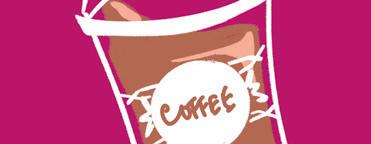


1. Complete the crossword! Only 100 per cent accurate puzzles will be accepted.
Source: sudokutodo.com
How to play
Each column and row must contain every number from one to nine without repetition. Each box must also have numbers one to nine with no repetition. Have fun and good luck! CAFETERIA LECTURE PROFESSOR TEXTBOOKS
Hint: cafe
Hint: big rock
Answer: Frankie Answer: Oakham Answer: Lake Devo



1. This residence building is home to nursing labs and health studies (full name)
4. Acronym for “Toronto Metropolitan University”
6. TMU’s athletic centre
7. Pedestrian-only campus street, often lined with chalk messages and fairs
10. Across the street from campus, where students hide between classes and catch a movie
12. Media school housed in the RCC, known for producing TV nerds
2. Complete the Google Form via the QR code below and add a photo of your completed crossword or visit The Eye office (SCC 207) with the completed crossword.
3. Await an email! The form will close end-ofday on Sept. 20 and winners will be contacted shortly afterwards.
2. TMU’s other athletic centre
3. What Balzac’s becomes when the SLC is full
5. TMU’s continuing education division
6. Brings your total to $4.50 instead of $5.10 at Balzac’s HINT: You bring it yourself
8. How most students arrive, often delayed, crowded and cursed
9. Maze-like academic building divided into North, South, East and West
11. What students call a “break” but professors call “catch-up time”
13. Popular coffee shop on TMU campus
14. In Pitman Hall, this breaks down at least once a month
15. TMU’s varsity athletic team


